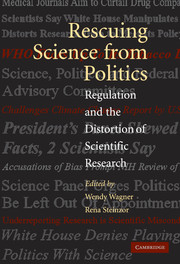Book contents
- Frontmatter
- Contents
- About the Contributors
- Acknowledgments
- Prologue
- Introduction: Principled Science
- PART I FREEDOM AND INDEPENDENCE
- 1 Defending Clean Science from Dirty Attacks by Special Interests
- 2 Basic Science at Risk: Protecting the Independence of Research
- 3 Publication Bias, Data Ownership, and the Funding Effect in Science: Threats to the Integrity of Biomedical Research
- 4 Science and Subpoenas: When Do the Courts Become Instruments of Manipulation?
- PART II TRANSPARENCY AND HONESTY
- PART III A PUBLIC INFRASTRUCTURE FOR SCIENCE
- PART IV RECOMMENDATIONS AND CONCLUSION
- Index
1 - Defending Clean Science from Dirty Attacks by Special Interests
Published online by Cambridge University Press: 04 August 2010
- Frontmatter
- Contents
- About the Contributors
- Acknowledgments
- Prologue
- Introduction: Principled Science
- PART I FREEDOM AND INDEPENDENCE
- 1 Defending Clean Science from Dirty Attacks by Special Interests
- 2 Basic Science at Risk: Protecting the Independence of Research
- 3 Publication Bias, Data Ownership, and the Funding Effect in Science: Threats to the Integrity of Biomedical Research
- 4 Science and Subpoenas: When Do the Courts Become Instruments of Manipulation?
- PART II TRANSPARENCY AND HONESTY
- PART III A PUBLIC INFRASTRUCTURE FOR SCIENCE
- PART IV RECOMMENDATIONS AND CONCLUSION
- Index
Summary
Deconstruction Writ Large
When a new scientific study suggests that an industry's products or activities may be causing unanticipated adverse effects on health or the environment, a typical reaction by that industry or other affected stakeholders is to attack the messenger. This chapter details the strategies that risk-producing industries have employed to deconstruct scientific studies and to create the impression among regulatory agencies and the general public that such studies are no more than “junk science.” These strategies depend on a number of legal processes and tools that not only legitimate partisan, biased attacks on research, but also provide a broad array of mechanisms to facilitate these attacks.
Scientific studies documenting risk pose a serious threat to an industry's economic well-being, motivating companies and industry trade associations to mount aggressive efforts to belittle that threat by demanding the underlying data, reanalyzing those data, finding flaws with the study's conception and execution, hiring scientists to publish letters to the editors of scientific journals, withdrawing support from the academic institutions that employ the authors of the study, and challenging the integrity of the scientists in available forums. The scientists who produce such studies are rarely prepared to ward off such attacks on their work and even on their personal integrity. Unlike the industries that launch the attacks, they cannot afford to pay other scientists to respond to the attacks, hire expensive lawyers to defend their studies in court, and retain public relations firms to defend their reputations in academia and the public at large.
- Type
- Chapter
- Information
- Rescuing Science from PoliticsRegulation and the Distortion of Scientific Research, pp. 24 - 45Publisher: Cambridge University PressPrint publication year: 2006
- 2
- Cited by



